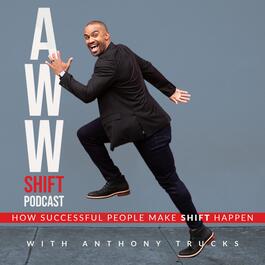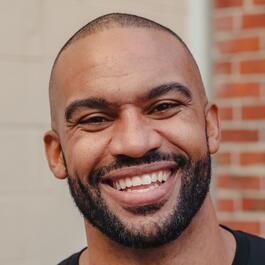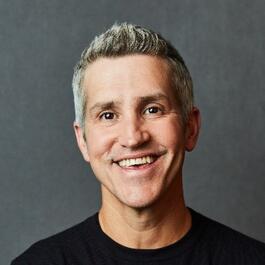
How to Create and Achieve Your Goals with Jon Acuff
How to Create and Achieve Your Goals with Jon Acuff In today's episode, our guest is Jon Acuff. He is the New York Times bestselling author of seven books, including his most recent, Soundtracks, The Surprising Solution To Overthinking. For over 20 years, he's also helped some of the biggest brands tell their story, including The Home Depot, Bose, and Staples. His fresh perspective on life has allowed him to write for Reader's Digest, Fast Company, The Harvard Business Review, and Time Magazine. He lives outside Nashville, TN, with his wife Jenny and two teenage daughters. [3:57] Why should I listen to you? I think you should listen to anybody, and that's brave enough to start talking. I think many people are interested so whether it's me or somebody else, let's go… [5:28] Did you always have that kind of calm desire? I was a jerk in college, like in senior college, and I got involved in raves like so and so. No, but I wouldn't say that was a good decision. That was not a great period of my life. So no, I think the older I get, the more I go. I want to do a small degree of things I love, not a bunch of things I kind of like, so as I, you know, talk about it, people say they don't have enough time. But you usually have enough time for the small degree of things. It's just that you're spending a lot of time on things you kind of sort of like, so let's narrow that down a little bit so you can really focus. [6:15] How did you figure out what you loved? Well, a lot of it is self-awareness; you can't achieve any goal or any sort of accomplishment without a degree of self-awareness. Because if you don't know how you operate, you just continue to make mistakes. An easy example would be that if you don't know you're a morning person, you'll schedule difficult tasks later in the afternoon and wonder why they're so hard. So for me, I don't do breakfast. because breakfast is too expensive, and that is self-awareness. It is paying attention to yourself. [8:13] How can someone get into the flow of even knowing what to test and try? I'm going to brainstorm as many things as I want. But then, as I get closer to actually doing the things I start to eliminate, I'm going to try experiments. I'm going to say, I've tried this for 30 days. "What really happened?" Was it worth it? Did it go the way I wanted it to? If there was a business function in which I felt fulfilled, where I served and helped real people but did not see progress,? If I don't, I'm going to eliminate it. The average American watches two months of television per year. Two months, dude. If you only watch one month of TV a year, you will still get to watch a whole month. There's a whole industry dedicated to you not doing things like Netflix doesn't want you to write a book. They care about your time, and their whole business is designed around maximizing your time. [10:34] Did you have to go through some kind of crazy to find this nuance out? So for me, the big shift was in my early 30s. I started a blog, and the blog started to gain a little traction, and I realized that it was important to me. I had a full-time job, two kids under the age of 4, and a beautiful wife. So I had to start stealing time. I had to get up at 5 a.m. I would practice speeches because I do probably 50 to 60 gigs a year. I would practice speeches on the drive to work. I just decided I'm going to be disciplined, I'm going to have grit, I'm going to have willpower, and I found something I wanted more than what I currently had. People change for two reasons: a lot of pain or a lot of desire, and I'd rather it be a lot of desire. So once I had, like, a little bit of light at the end of the tunnel, I started sprinting toward that tunnel. That's what changed it for me, I think. [15:10] When I want to film videos, I mentally switch between things. Have you ever had to train yourself that way too? 200%. I call those ginger moments. So the reason they serve ginger at sushi restaurants is to cleanse your palate between bites. So what I do is I need a "ginger moment" between these two activities because it's such a big switch, so I do a quick three-minute walk around the neighborhood or I listen to a song or whatever the moment requires. So that gives me time to think. I think it's also the same way. So I'll say this: We're about to transition in this podcast. We're going to need to write down whatever the two warnings are, but I think about it like that. I'm not naturally great at switching, but I'm getting better at using tools that I've developed over time. [17:20] How do you look at your life in harmony and have everything moved together smoothly? Well, I love that work. That makes a ton of sense. Again, I think we agree on so many different things. It's such a fun way. It's why it's fun to have this conversation. I love harmony. You're right about balance. It's a myth. It doesn't exist. And so for me, the way I look at it is that I kind of look at it in seasons. So I know what one of my goals is each year. We did it last year and will do it again this year because I will be in the mountains with my family. When I'm there, I'm going to work a day and a half each week. I've got meetings, I've got some things, and I'm going to cram it all in and have kind of sprint days, but the rest of the time we'll be hiking with my family. How do I maintain that balance and respect the seasons, wherever I am? That doesn't make sense in a world where that doesn't work to explain what my most expensive month is. So I think that's how I look at Harvey. What season on my end is a book-reading season or a speaking season, and how do I ebb and flow within that state? [21:03] How do you set goals? Most people are really good at achieving goals and certain segments of their lives. Okay, I need relational goals. So one of my relational goals is to help my youngest daughter train for a half marathon. I wrote this book about mindset, and one of the ideas in there that a lot of people talked about is your thoughts turning. Your thoughts simply desire it, but they never change. But if I have a relational goal, it changes how I treat my family. One month, I said I was going to encourage someone for a month. I made a list of people, and then I would text them something. The content of the message goes thus: "Let's think about creativity." You always come to mind when I think about creative people. "I hope you're doing well." "You have no idea how much I needed that today," said 90% of them. So I believe that my podcast is titled "All it takes is a Goal" because I think that you care about a portion of your life. [29:40] How do you think people can develop that mindset to create momentum that doesn't exist? So, for one thing, it's going to happen. Don't feel like a failure when it happens. Every goal sucks in the middle. Everything, like success, is boring in the middle. It's you doing a million. Nobody sees that there's nobody cheering. So it's going to happen, but what I like to do is create what I call a motivation portfolio. So what I like to do is walk people through an exercise called the middle week. [35:40] Can you unravel your book? When I work on an idea like this, I consider three things. One, is there a personal connection? Two, is it capable of producing something unique? Three: Is there a spot for me in the marketplace? The book teaches three things. One, how do you retire your broken soundtracks? Get rid of the ones that are in the way too. How do you replace them with new soundtracks? Your brain is waiting to be informed that there has already been a motion. [48:00] What promise did God make to the world when he created you? Three people were given talents. The first was five, the second person was two and the third was given one. The person with one talent buried his own while others doubled theirs. One person buried it and missed out on it. So I like to tell people, "Let's grab a shovel." Maybe you buried a part of yourself; let's go get a shovel because there's more to you than you think. So I think he said, "Okay, I'm going to help you teach other people how to grab a shovel." Key Quotes [12:20-12:22] Your excuses cannot get bigger than the dream. [13:30-13:32] Time won't find you; you have to find the time. How to connect with Jon Acuff Instagram: https://www.instagram.com/jonacuff/?hl=en Facebook: https://www.facebook.com/authorjonacuff/ Twitter: https://mobile.twitter.com/jonacuff/with_replies
From "Aww Shift"




Comments
Add comment Feedback